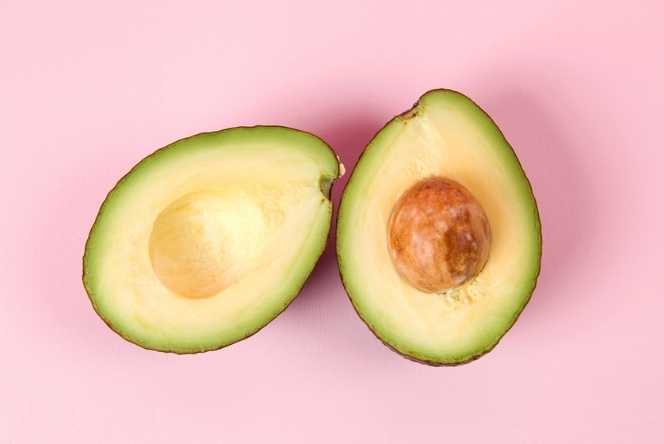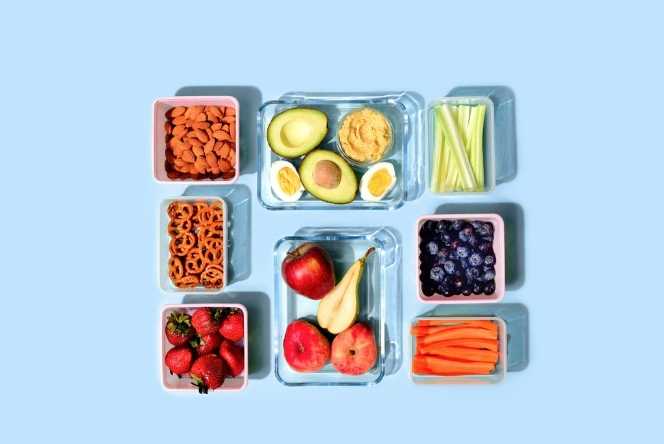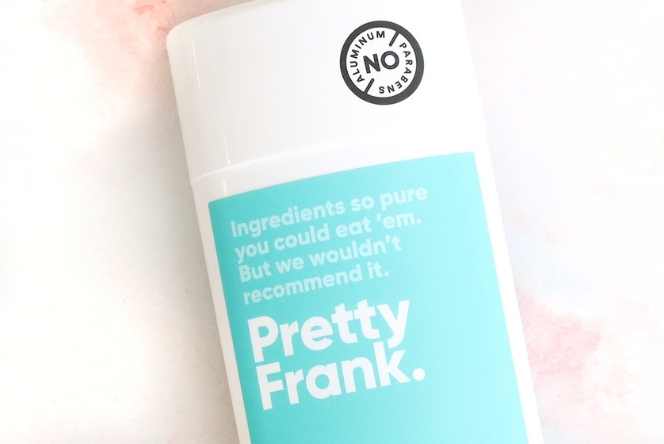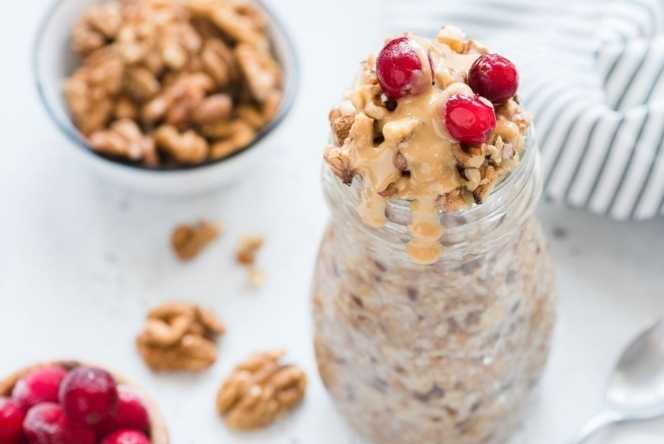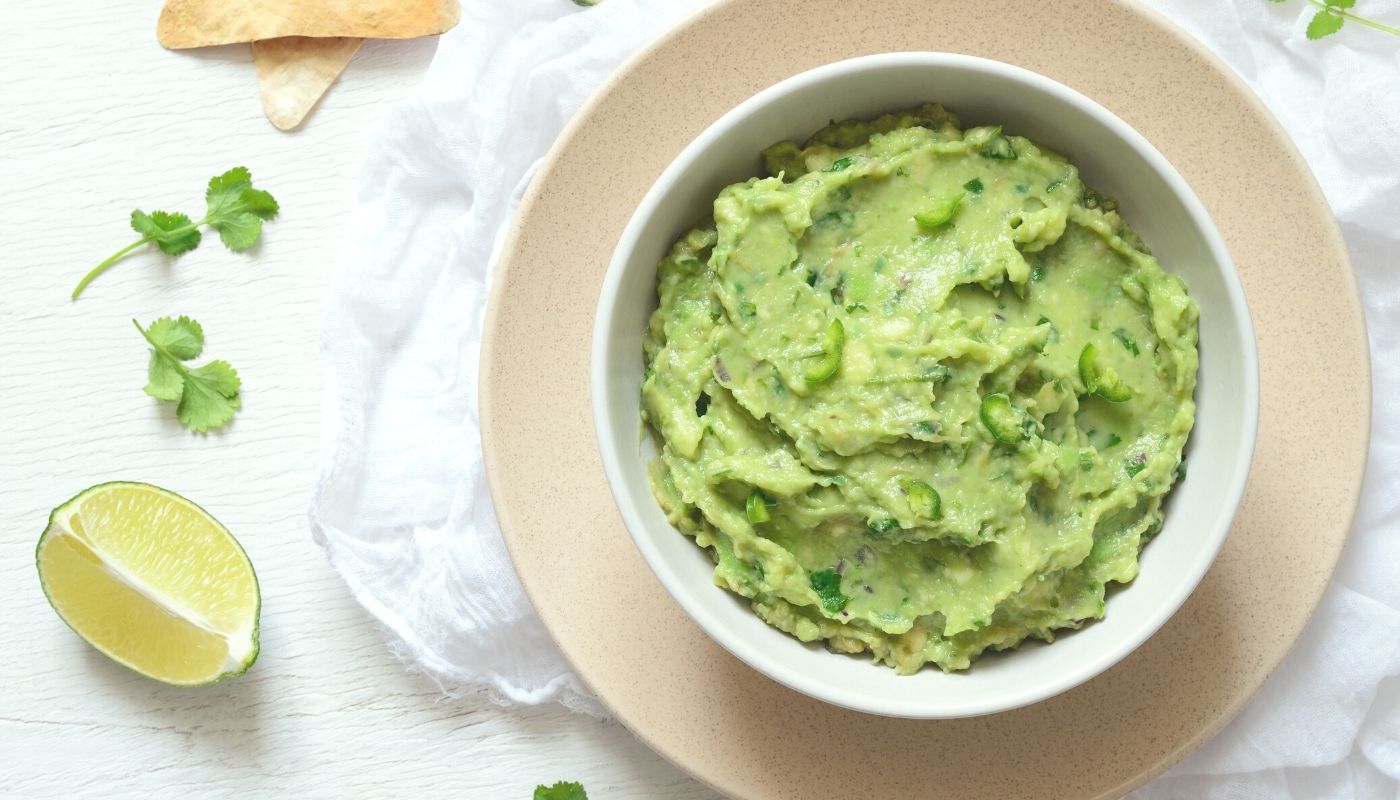The gut microbiome is one of the hottest areas in science right now – one that is rapidly evolving globally, and rightfully so, considering it’s been linked to everything from our brain health, immune systems, chronic disease, our weight, our moods and more.
“Our immune system is central to all aspects of our health… If the gut bacteria are healthy, it’s likely that the immune system is running well. If the gut bacteria are not healthy, we are at increased risk of developing autoimmune diseases and cancer.” – Dr. Andrew Weil
Bacteria are everywhere and they are essential to our health. Our bodies by definition are an ecosystem and they are home to an estimated 40 trillion bacteria. They cover nearly every surface of our body (like our skin and dental microbiomes), but live primarily in the large intestine of our digestive track, making up what’s known as the gut microbiome or microbiota. The health of this massive gut colony is essential to nearly all aspects of our health. Its primary role is to digest our food, protect us from outside foreign invaders and pathogens, synthesize key vitamins ( like D,K, B12), nutrients and metabolites and to modulate neurotransmitters. Your gut microbiome is also a key component of your immune system.
Our gut microbiome is as unique as a fingerprint with its own nervous system that has been dubbed “the second brain.” One primary reason is due to the gut brain axis which is directly linked through the vagus nerve. It’s also been estimated that over 90% of the body’s serotonin is stored in the gut, which plays an important role in vital functions like sleep, mood, pain sensitivity, and appetite.
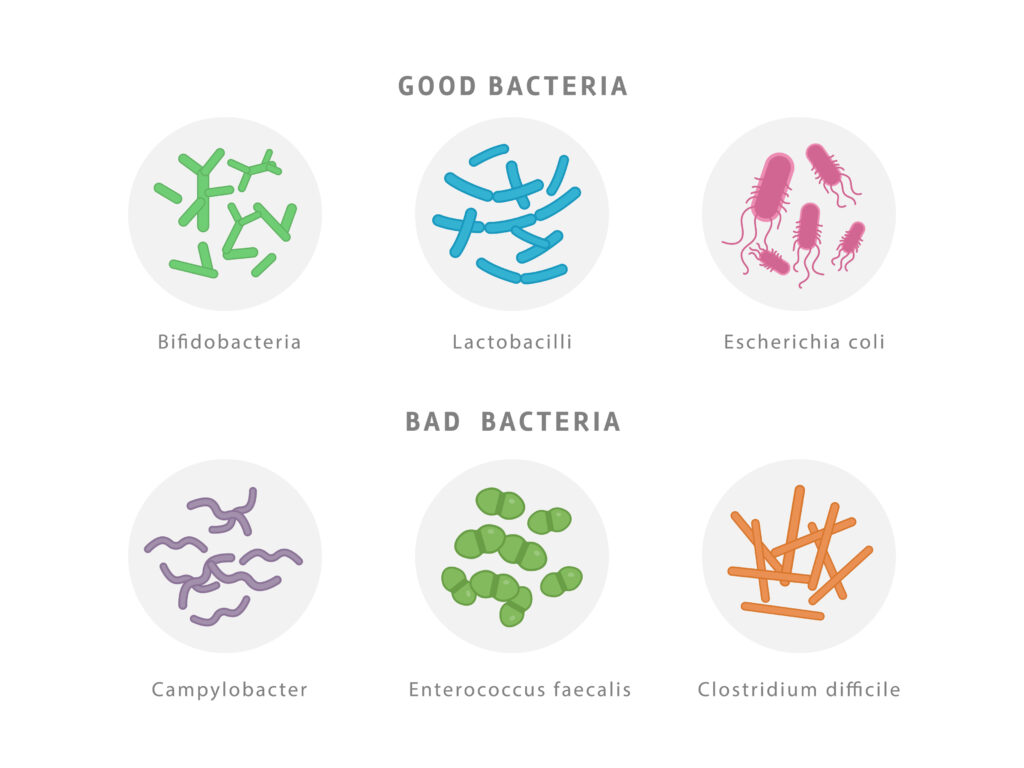
The gut microbiota has been linked to all kinds of health issues including food sensitivities, diabetes, obesity, inflammation, autoimmune conditions, depression, autism, and more. Microbiome diversity has been linked to increased health and lowered disease, which is why it’s important to nourish it. Think of it like a rainforest, the more diverse the ecosystem, the healthier it will be.
“Most people don’t realize that your gut, brain and skin can communicate… I tell my patients, your skin is a window into your overall health and wellness. Put simply, your skin reflects your health.” – Dr. Whitney Bowe
Our unique gut microbiome begins in utero and shapes our health throughout our life. However, you can balance and care for your gut microbiome through lifestyle modifications and your diet. By eliminating things that cause harm and incorporating things that provide benefits, you’ll notice a significant difference in how you look and feel.
Here are a few of my tips for nurturing your gut microbiome and reducing things that are harmful to it.
What to Limit to Avoid Damaging Your Gut Microbiota
Digestive issues, skin issues, vitamin deficiencies, autoimmune diseases, chronic stress, and mental issues may be a sign that your gut is already in a state of dysbiosis. Which means there is an imbalance or overgrowth of harmful bacteria.
1) Limit Sugar and packaged foods. The first step to taking care of the gut microbiome is crowding out things that can lead to an overgrowth of bad bacteria, (“dysbiosis”) like refined, processed and artificial sugars. Artificial sweeteners can disrupt the gut microbiome, and have even been shown to increase glucose intolerance. High sugar consumption also accelerates aging and affects the overall health and appearance of your skin.
A general rule of thumb: If it looks like something your grandmother would eat, great. If it comes in a bag or a box, it’s best to limit it.

2) Cut Out Dietary Emulsifiers. Studies have also shown that emulsifiers (like carrageenan, soy, polysorbates, guar gum, and canola oil) can negatively affect the gut microbiome. Oil and water don’t mix, so the food industry regularly uses emulsifiers to help mix ingredients in a variety of packaged foods. Emulsifiers have been shown to increase inflammation, disrupt the GI lining and the profile of your gut microbiome.
3) Limit NSAIDS and Antibiotics. Repeated use of anti-inflammatory drugs (like Ibuprofen, Aleve, Motrin, Advil) has been shown to be damaging to the gut lining. Antibiotics (which mean “anti-life”) can eradicate the good gut bacteria colonies that we need to thrive optimally, along with the bad, creating a state of gut dysbiosis. When that happens, it’s not likely to reverse without diet and lifestyle intervention.
It is best to limit antibiotics except when absolutely necessary. The CDC estimates over 47 million antibiotics are over-prescribed for viral infections each year (in which they are virtually useless). They also show up in our food supply through mass factory farmed animals that are regularly fed a diet of antibiotics.
4) Replace Anti-bacterial Products like harsh antibacterial soaps and cleaning products that are damaging to beneficial bacteria that our bodies need to thrive optimally. Have you heard of the hygiene hypothesis? It states that while many believe children especially should be kept in the cleanest environments possible, that lack of exposure to germs does not allow the immune system to develop resistance to disease.
5) Limit Meat. Studies have shown that moderate amounts of low-fat meat (along with only eating organic meat without hormones and antibiotics) is better for increasing the diversity of beneficial bacteria in your gut microbiota. Highly processed packaged meats can also increase your risk for certain cancers like colon cancer.
5 Tips for Balancing Your Gut Microbiome
1) Eat the Rainbow. Eating a healthy diet daily that is rich in diversity of whole plant foods such as fruit, vegetables and whole grains will maximize your gut microbiome diversity. (Carbohydrates are the primary source of energy for your gut microbiome, so a wide variety of carb types are needed.) Whenever you can buy organic or fresh foods locally, that’s best. When sprayed with pesticides, even fruits and veggies can be harmful to your gut microbiome.
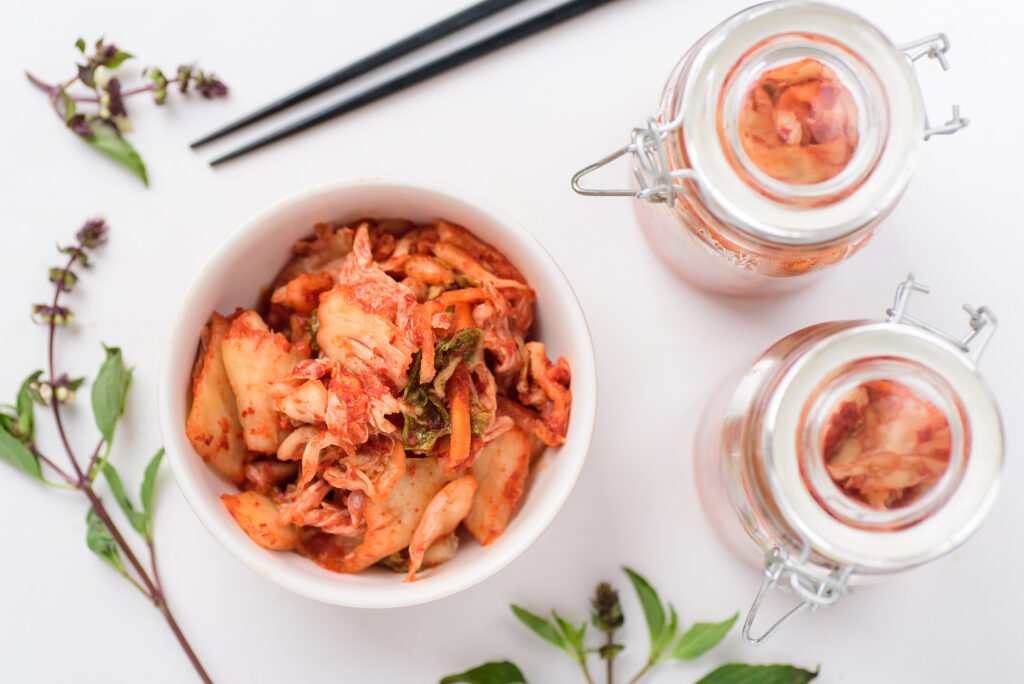
Kimchi, a staple in Korean cuisine, that’s made with salted and fermented vegetables.
2) Add Fermented or Cultured Foods to Your Diet. Another way to introduce good bacteria is by adding fermented foods like kombucha, sauerkraut, kimchi, miso, kefir, and coconut yoghurt into your diet. You can also experiment with fermenting your own veggies at home with starter kits from Cultures for Health.
Tip: Start small by only consuming a teaspoon or 2 daily and then work your way up. That allows your gut microbiome to adjust slowly overtime so you don’t experience digestive side effects.
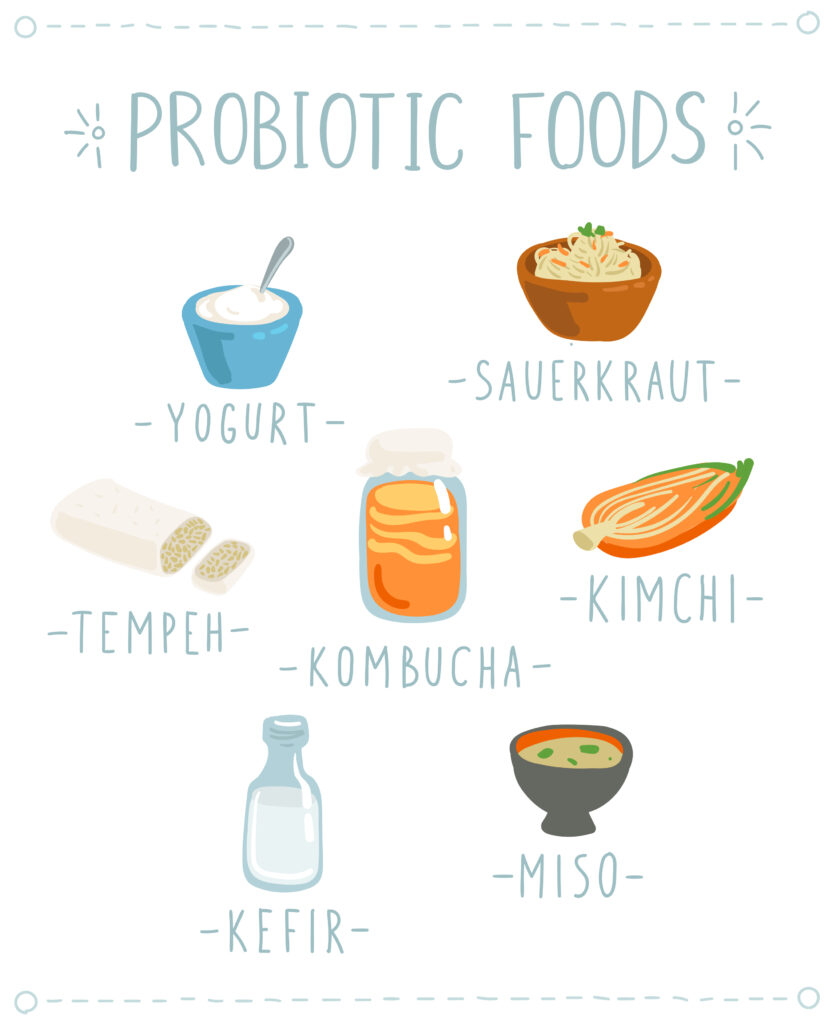
3) Consume Foods Naturally Rich in Prebiotics, which are indigestible fibers that feed the beneficial bacteria in your gut microbiome. Think of prebiotics like “fertilizer” and your gut microbiome as “soil.” Foods like garlic, asparagus, bananas, onions, leeks, apples, dandelion greens, flax seeds, and jicama root are excellent sources of prebiotics.
4) Probiotics. Like all things, some probiotics are far better than others. There are countless varieties on the market so it’s best to look for a probiotic with at least 25-30 billion CFUs (colony forming units) with specific strains listed (like lactobacillus and bifidobacteria), as well as shelf life. Most reputable brands list independent studies conducted with their products.
Klaire Labs, Jarrow Formulas, MegaSporeBiotic, and Seed are brands I personally love.
Note: Specific probiotic brands or strains that cause excessive symptoms such as bloating or headaches may not be best suited for you. In some cases probiotics can exasperate the medical condition SIBO, (Small Intestinal Bacterial Overgrowth.)
“All disease begins in the gut. All disease ends in the gut.” – Dr. Steven Gundry
5) Limit Your Stress. Making stress management a priority is incredibly powerful in improving your health. Recent studies have shown that chronic stress and inflammation can throw off the gut brain axis, leading to a disruption in your gut microbiome. Our bodies are designed to respond rapidly to stress, but it doesn’t differentiate between threats. Whether we are being chased by a tiger or racing through traffic to make it to an appointment on time, our stress response is the same.
When the body is in a “fight or flight” stress state, it halts digestion (so you can flee), increasing cortisol, and creating a stressed environment for the body and gut microbiome. All that being said, it is important to eat in a calm, restful state whenever possible to allow your body the space to nourish itself properly.
Tip: Aim for getting at least 7 hours of sleep a night to minimize your stress, inflammation, and cortisol levels –all of which can negatively affect your gut microbiome.
How to Promote a Healthy Gut Microbiome From a Young Age

It’s never too early to care for the gut. In fact, it is recommended that you expose babies to healthy bacteria early on while only using antibiotics when absolutely necessary. Establish healthy habits from the start by introducing your children to dietary fiber and incorporating fruits and veggies into their diets.
You can also find probiotics specifically formulated for children from high-quality companies such as Klaire Labs or Jarrow Formulas.
** Disclaimer: This is for educational purposes only. Always seek the advice of your physician, pharmacist, or other qualified health care provider with any questions you may have regarding a medical condition or treatment and before undertaking a new health care regimen or taking any new supplements. **
About Me

I’m so glad you’re here! If we’ve not yet met, my name is April Likins and I’m a board-certified health coach trained at Duke Integrative Medicine and the Institute for Integrative Nutrition.
I’m fiercely passionate about helping busy women create sustainable long-term changes with their health so they can live happier lives, experience more energy and joy, and feel their best inside and out!
Want to Work Together On Your Health and Wellness Goals?
I love helping women create sustainable long-term changes with their health so they can feel their best inside and out. Together we’ll optimize your health utilizing a whole-body approach, working on things like eating more clean whole foods, reducing your inflammation, and lowering your stress so you can thrive and achieve your full potential.
To get started, fill out this form to schedule a complimentary 30-minute health coaching consultation with me.
Free Resources You’ll Love:
Additional Reading & Resources:
“The Mind Gut Connection” by Emeran Mayer, MD
“Brain Maker” by David Perlmutter, MD
“The Good Gut” by Justin Sonnenburg and Erica Sonnenburg, PhDs
“Eat Dirt” by Dr. Josh Axe
“The Beauty of Dirty Skin” by Whitney Bowe, MD
